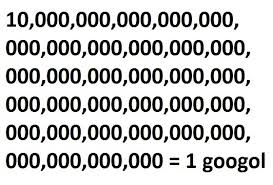googol 大数,10 的100 次方据说是来自19 世纪美国数学家Edward Kasner 的侄子创造的词。Kasner 希望为10 的100 次 方取一个好名字,苦思不得其解,开玩笑问他侄子,他侄子正沉迷于漫画小说人物Barney Google,就建议叫googol.于是,一个新词就诞生了。从某种程度上也反映出取名字的严肃和 随意的双重性质,当想不出一个好名字的时候,很可能就随便取个名字。比较guillotine.
- googol
- googol: [20] There are comparatively few ‘new’ words in the English language – that is, words which have not been made up from combinations of old words, or borrowed from other languages, but have sprung up as entirely new growths – but this is one of them. When in the 1930s the American mathematician Dr Edward Kasner was trying to think of a name for an unimaginably large number, ten to the power of a hundred, he asked his nine-year-old nephew Milton Serotta for a suggestion, and googol was what he got. It has never really caught on in technical use, although it has spawned a compound of its own – the googolplex, ten to the power of a googol.
- googol (n.)
- number represented by 1 followed by 100 zeroes, 1940, in "Mathematics and the Imagination," a layman's book on mathematics written by U.S. mathematicians Edward Kasner (1878-1955) and James R. Newman, the word supposedly coined a year or two before by Kasner's 9- (or 8-) year-old nephew (unnamed in the book's account of the event), when asked for a name for an enormous number. Perhaps influenced by comic strip character Barney Google. Googolplex (10 to the power of a googol) coined at the same time, in the same way, with plex.
